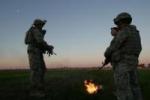Before a single word was printed, many speculated that embedded reporters would fall victim to
Stockholm Syndrome, the condition, named after a notorious 1973 incident in the Swedish city, in which hostages begin to identify with their captors. Media commentators like Andrew Jacobs at The New York Times, Richard Leiby at The Washington Post, and Carol Brightman at The Nation argued that as embedded journalists became socialized into military culture, they would develop relationships with the soldiers and start reporting from the military point of view.
While labeling this condition Stockholm Syndrome is perhaps slightly inflammatory, much sociological research suggests socialization is one of the military’s greatest strengths. In his classic collection of essays,
Asylums,
Erving Goffman noted the military is a total institution that not only controls all an individual’s activities, but also informs the construction of identity and relationships. In total institutions,
such as the military, prison, or mental institutions, Goffman argued, the individual must go through a process of mortification that undercuts the individual’s civilian identity and constructs a new identity as a member of the institution. In such a communal culture,
individuality is constantly repressed in the name of the institution’s larger values and goals.








 It's frustrating when you're right.
It's frustrating when you're right.






 "A Sherman can give you a very nice... edge."- Oddball,
"A Sherman can give you a very nice... edge."- Oddball, 



Bookmarks